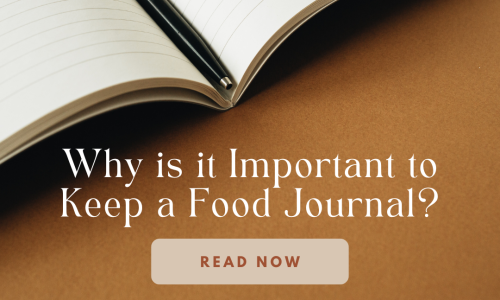Why is it Important to Keep a Food Journal?

Keeping a consistent, reliable record of your eating habits and dietary choices is an often underappreciated but effective tool in developing good eating habits. Whether it is weight loss, improving your diet, or simply understanding your eating habits a little bit more than usual, it is an extremely beneficial choice to track your food and meals.
This is easier said than done, however, as our daily lives are often filled with inconveniences and stress. Who has time to remember all they ate throughout the day when they have unfinished gigs and virtual mountains of spreadsheets that need attention?
That’s where food journaling comes in. What is a food journal, you ask? A food journal is a periodic record of your eating habits. The meals you ate, the drinks you drank, and the snacks you snuck under the table when you thought no one was looking. It can be done on paper, in a notebook that can fit into your purse or backpack, or on your phone, in your notepad, or any of the numerous designated food journaling apps. Whichever method you pick, it should be on a medium that you can keep handy, so you never have to worry about forgetting to put down an entry.
How to food journal
How do you efficiently use a food journal? There are many things to be considered, amongst which are:
1: What you eat: Be as specific as possible, making sure to note each part of the meal, including any side dishes or garnishes, ingredients and spices, and any drinks taken during or after the meal.
Take care not to skip logging any snacks taken. They may seem small and insignificant, but they add up in calories with each absent-minded bite or nibble. To maximize the efficiency of a food journal, not leaving out any details is very important.
2: How much you eat: It can be difficult to measure how much was eaten after it has been eaten, which is why it is important to have a way to make a quick journal entry on you at all times. You can use a food scale, or you can compare the quantity of food to other physical objects, like bowls and cups, or even tennis balls.
Once again, leave no food or snacks unaccounted for, no matter how little it might seem.
3: How you feel: Your mood is an important factor when logging mealtimes. How were you feeling when you sat down for lunch? What was your emotional state when you popped that cookie in your mouth? Did you eat out of boredom? Sadness? Excitement? It might not come as a surprise that some people tend to eat more when stressed, some people tend to confuse boredom with hunger, and others still might not be able to eat when in a foul mood.
Noting how you feel when eating and how it affects your feeding habits makes it easier to understand how your dietary choices can affect your mental health, and vice versa.
Benefits of a food journal
Food journaling is a wonderful healthcare system, with benefits including:
1: Weight control: Possibly the most common reason people make use of food journals is to keep track of those extra calories and cut them off, or at least drastically minimize them. Being overweight is a major health issue, and can lead to a range of health issues, including diabetes, obesity, and heart problems, which is one of the leading causes of death.
On the other side of the spectrum, keeping track of feeding habits can also help with weight gain, as you can determine how much you’re eating and work towards healthily gaining weight by increasing your calorie intake with heavy but healthy food choices.
With a food journal, it becomes much more convenient to track and minimize unhealthy food and snacks, and to make much more conscious healthy dietary choices in our day-to-day lives.
2: Healthy eating habits: Monitoring how many calories are consumed isn’t the whole gist of the matter. What kinds of calories and nutrients specifically an often underlooked aspect of healthy eating can be much more properly addressed through the use of a food journal? You’d be able to spot unhealthy eating patterns and choices and minimize mindless grazing out of boredom or stress.
For example, you might feel you aren’t eating much throughout the day, but once you start paying attention to what you eat, you might find out that the few times you do eat are packed with highly dense calories and other unhealthy options, like high fat and cholesterol. Keeping a good journal helps spot these kinds of unhealthy patterns and make better choices.
3: Food sensitivities: Apart from allergies, which are much more obvious to note and avoid, our bodies react in several ways to various things we eat. Sometimes, we might not notice, due to our own negligence or external factors like work, but through the use of a food journal, noticing what food or snacks trigger certain things in our bodies gets easier. From Irritable Bowel Syndrome (IBS) to heartburn and non-celiac gluten sensitivity, certain foods have certain effects on us, and using a food journal to monitor and note such changes is a very important part of healthy eating.
Discussing your dietary habits with a nutritionist can be a game-changer, especially when coupled with a food journal. This approach can significantly help you eat right and make the best feeding choices for your well-being. As part of your stay at Tennessee Fitness Spa, we invite you to schedule a one-on-one meeting with our expert nutritionist, Belinda Jones. Let us guide you through the process of understanding your eating habits and making nourishing choices. Don’t miss out on this opportunity to enhance your health journey. Click here to schedule your appointment today and make a significant stride toward a healthier, happier you!

